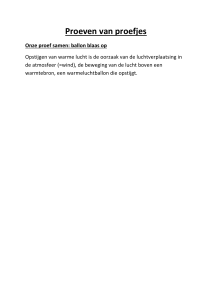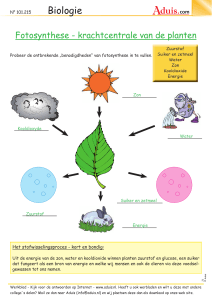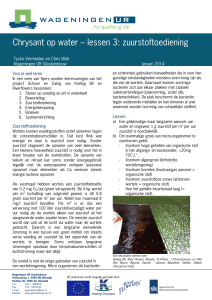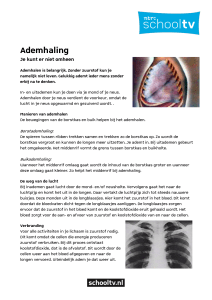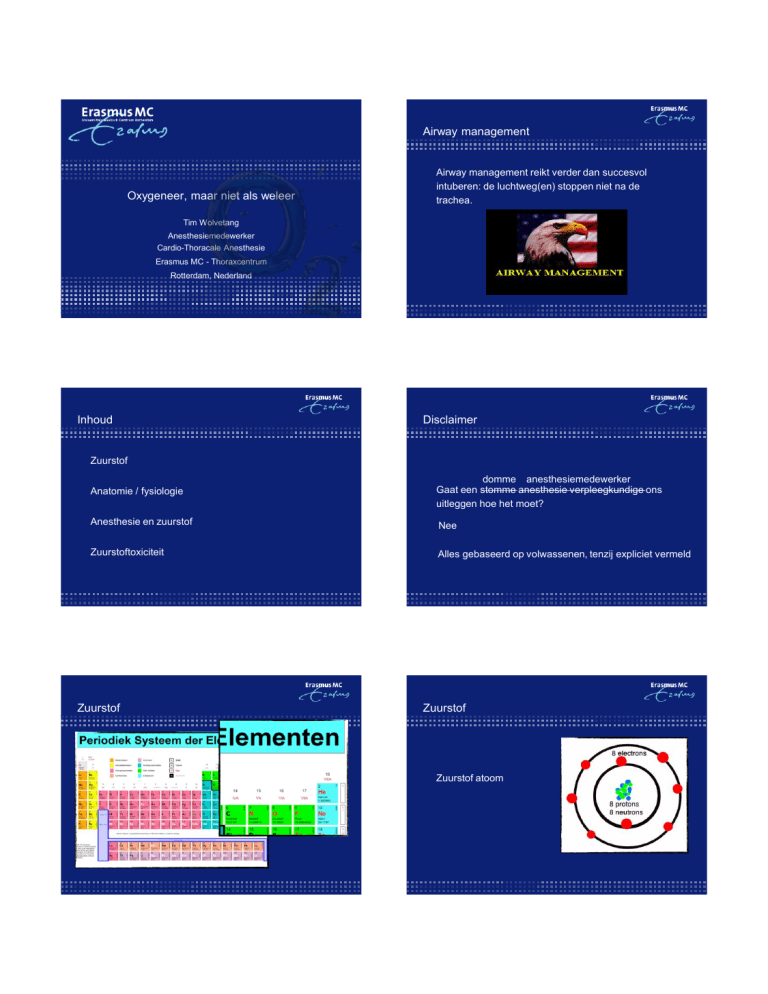
15-12-2013
Airway management
Oxygeneer, maar niet als weleer
Airway management reikt verder dan succesvol
intuberen: de luchtweg(en) stoppen niet na de
trachea.
Tim Wolvetang
Anesthesiemedewerker
Cardio-Thoracale Anesthesie
Erasmus MC - Thoraxcentrum
Rotterdam, Nederland
Inhoud
Disclaimer
Zuurstof
Anatomie / fysiologie
domme anesthesiemedewerker
_______ anesthesie
_________________________
Gaat een stomme
verpleegkundige ons
uitleggen hoe het moet?
Anesthesie en zuurstof
Nee
Zuurstoftoxiciteit
Alles gebaseerd op volwassenen, tenzij expliciet vermeld
Zuurstof
Zuurstof
Zuurstof atoom
1
15-12-2013
Zuurstof
Zuurstof
Zuurstof radicalen
Molecuul met ongepaard
elektron
Zuurstof molecuul
Zuurstof
Reactive Oxygen Species
(ROS)
Reactieve zuurstof
verbindingen
Anatomie / fysiologie
Anatomie / fysiologie
Idealisatie van de luchtwegen volgens Weibel
2
15-12-2013
Anatomie / fysiologie
Luchtwegen vallen samen tijdens expiratie
Minst uitgesproken bij mensen van 20 jaar
Meest aanwezig bij <5 jaar en groter >50 jaar
Leblanc, P. Effects of age and body position on airway closure in man. Journal of applied fysiology. nr 28 (1970) pp 448-455
Mansell, A. C. Bryan, H. Levison. ‘Airway closure in children’. Journal of applied fysiology. nr 33 (1982) pp 711-714
Anatomie / fysiologie
Diffusie
Vgas=
(A/T)*D*(P1-P2)
Anatomie / fysiologie
Pneumonocyten II
Surfactant release bij
stretching
West, J.B. R espiratoy fysiology. 8e editie. Lippincott, Williams & Wilkins, Baltimore 2008
Anesthesie en zuurstof
Van A tot Z:
Anesthesie
Breathing
Circulation
Don’t
Ever
Forget
Glucose
...
Zuurstof(toxiciteit)
Anesthesie en zuurstof
Wat doen we met pre-oxgeneren?
Creëren van een zuurstofreserve in het FRC, één van de
optimale omstandigheden voor intubatie
CaO2= (Hgb x 1.36 x SaO2) + (0.0031 x PaO2)
3
15-12-2013
Anesthesie en zuurstof
Intubatie
Anesthesie en zuurstof
Tijdens apneu (=expiratie) vallen luchtwegen samen
Alveoli worden afgesloten
Alle zuurstof in de achterliggende alveoli wordt
opgenomen
Resorptie atelectase
xxx
Anesthesie en zuurstof
CT beelden van atelectase na anesthesie
xxx
Anesthesie en zuurstof
Anesthesie en zuurstof
§ Atelectases ontstaan binnen enkele minuten na inleiding
§ Gevolgen van atelectase
- Hogere beademingsdrukken
§ Bij 85-90% van de patiënten wordt deze vergroot door
hoge zuurstof concentraties
- Daling saturatie
- Meer shunting
- Pneumonitis en associatie met pneumonie
Hedenstierna, G. ‘Oxygen and anesthesia: what lung do we deliver to the post-operative ward?’ Acta
Anaesthesiologica Scandinavia. nr. 56 ( februari 2012): pp 675-685.
§ 1.5 % van de patiënten krijgt post-operatief een
pneumonie. De mortaliteit in deze groep is 21%
§ Dit is ca. 1 op de ca. 317 patiënten, de incidentie van een
onverwachte moeilijke intubatie is 1 op 10.000
Arozullah, A.M., S.F. Khuri, W.G. Henderson, J. Daley. ‘Development and validation of multifactorial risk index for
predicting postoperative pneumonia after major noncardiac surgery.’ Annual internal M edicine. Nr 135 (2001) pp
847-857
4
15-12-2013
Anesthesie en zuurstof
Anesthesie en zuurstof
§ Voorkomen atelectase
§ Inspiratoire zuurstof fractie bij pre-oxygenatie, apneutijd en
atelectase
- Vermijden 100% zuurstof
- PEEP, ook tijdens pre-oxygenatie
- Zittende houding van de patiënt (hoofd omhoog)
- Recruitment manoeuvre, met 30 à 40 mmHg druk en
maximaal 40% inspiratoire zuurstof fractie. Cave
bloeddruk.
Hedenstierna, G. ‘Oxygen and anesthesia: what lung do we deliver to the post-operative ward?’ Acta
Anaesthesiologica Scandinavia. nr. 56 ( februari 2012): pp 675-685.
Anesthesie en zuurstof
- Bij 30% vrijwel geen atelectase op korte termijn
> Apneutijd niet gemeten
- Bij 60 % en 80 % een beetje atelectase
>Apneutijd bij 80%: ca. 5 minuten
Edmark, L., U. Auner, M. Enlund, G. Hedenstierna. ‘Oxygen concentration and characteristics of progressive
atelectasis formation during anaesthesia’. Acta Anasethesiologiva Scandinavia. nr. 55 ( september 2010): pp 75-81.
- Bij 100% tienmaal meer atelectase dan bij 80%
>Apnuetijd bij 100%: ca. 6 a 7 minuten
Rothen, H.U., B. Sporre, G. Engberg, G. Wegenius, A. Reber, G. Hedenstierna. ‘ Prevention of atelectasis during general anesthesia’. Lancet. nr. 345 (1995) 1387-1391
Anesthesie en zuurstof
Belang van PEEP
QuickTime™ en een
-decompressor
zijn vereist om deze afbeelding weer te geven.
Edmark, L., U. Auner, M. Enlund, G. Hedenstierna. ‘Oxygen concentration and characteristics of progressive
atelectasis formation during anaesthesia’. Acta Anasethesiologiva Scandinavia. nr. 55 ( september 2010): pp 75-81.
Anesthesie en zuurstof
Anesthesie en zuurstof
Hoge PEEP ≠ hogere kans op barotrauma
Grote(re) ∆P wel geassocieerd
ECHTER
Bij 20 PEEP bij ∆P 23 (+/- 1) barotrauma
Bij 50 PEEP bij ∆P 24 (+/- 1) barotrauma
Bij verwachte moeilijke luchtweg of ernstige co-morbiditeiten
altijd 100% zuurstof!
5
15-12-2013
Zuurstoftoxiciteit
Zuurstoftoxiciteit
Zuurstoftoxiciteit
Zuurstoftoxiciteit
§ Vasoconstrictie (coronair en cerebraal!)
Hyperoxia is associated with increased mortality in patients treated with mild
therapeutic hypothermia after sudden cardiac arrest.
Janz et al. Critical care medicine 2012 Dec;40(12):3135-9
§ Schade / vernietiging celmembraan
§ Schade aan longepitheel (oedeem en atelectase)
§ Apoptose
§ Schade aan DNA / RNA (carcinogeen)
Zuurstoftoxiciteit
Association between arterial hyperoxia following resuscitation from cardiac arrest
and in-hospital mortality.
Hope Kilgannon et al. JAMA. 2010 Jun 2;303(21):2165-71. doi: 10.1001/jama.2010.707.
Zuurstoftoxiciteit
Association Between Hyperoxia and
Mortality After Stroke: A Multicenter
Cohort Study.
Rincon et al. Critical care medicine 2013 Oct 25. [Epub ahead of print ]
6
15-12-2013
Samengevat
Take home message
Preoxygenatie / beademing met 100%:
- Atelectase
- Vasoconstrictie
- Toxiciteit
- Hogere mortaliteit in ASA V patiënten
Te weinig zuurstof is schadelijk, echter te veel
zuurstof ook. Geef niet zomaar 100% zuurstof, maar
overweeg of de patiënt dit nodig heeft.
Daarom
- Vermijd 100% zuurstof indien mogelijk
- Houd de long open: geef voldoende PEEP
Individuele rol
Blije patient
Vragen ?
Dank voor uw aandacht
Tim Wolvetang ♫ BA, RNA
Erasmus MC - Thoraxcentrum
[email protected]
010 - 70 35 207
7

